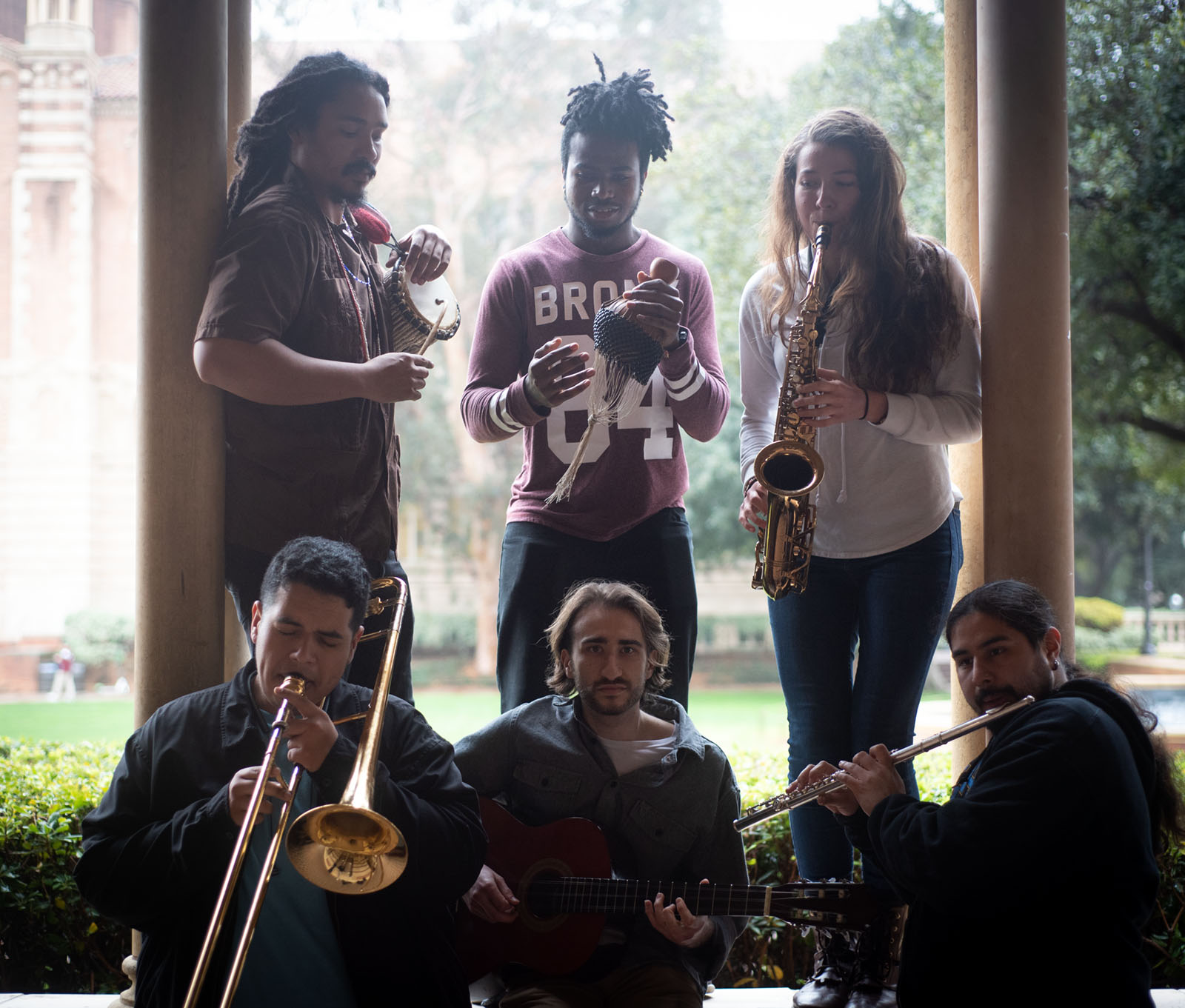Afro-Cuban band incorporates intercontinental sounds to inspire free-flowing dance

Ritmo de Orun, an Afro-Cuban band, will perform its first show as a group at Fowler Out Loud. The band’s name combines Spanish and Nigerian words, reflecting the two cultures involved in the style of music. (Eli Countryman/Daily Bruin)
Fowler Out Loud: Ritmo de Orun
Wednesday, 6 p.m.
Fowler Museum
Free
By Ethan Pak
March 5, 2019 10:09 p.m.
Ritmo de Orun combines the Spanish word ‘ritmo,’ meaning rhythm, and the Nigerian word ‘orun,’ meaning heaven or sun.
The name encapsulates the two cultures that inspire the Afro-Cuban band’s style. Ritmo de Orun will perform at the Fowler Museum on Wednesday – their first gig as a group. Douglas Sauceda-Vidal, who will play electric bass, said the band plasy a mixture of upbeat Afro-Cuban and Afrobeat music, the latter of which combines West African music with American funk and jazz. With an Afro-Cuban and Afrobeat repertoire, Sauceda-Vidal, a fourth-year ethnomusicology student, said the band’s goal is to get people dancing and grooving.
“(Afro-Cuban) music is a dance music, and when you’re a musician that plays dance music, you have to be open to the fact that it’s not just about you on the stage,” Sauceda-Vidal said. “You’re connecting with the audience, and the audience is not just staring at you – they’re dancing too.”
Originating in Cuba during Spanish colonization, Afro-Cuban music grew in reaction to the Atlantic slave trade between Cuba and the western coast of Africa. Paul De Castro, a lecturer in ethnomusicology, said rumba – a secular style of Cuban music – grew as a result of lower-class white and black Cubans working together at ports. Their cultures and music started mixing, eventually leading to the rumba style, which contains Spanish lyrics and African drumming, he said.
[RELATED: Global Melodies: Afro-Cuban Ensemble inspires audience interaction with lively tunes]
Today, traditional elements of Afro-Cuban music are still practiced. For example, the music of the West African-derived religion Santeria utilizes drum beats and the Yoruba language during rituals, which still can be seen in Cuba, De Castro said.
“When (Cubans) were doing ceremonies, they were playing secular music, (and) they were incorporating all of these elements in what we would call dance music,” De Castro said. “At the same time, they were drawing from their African background. No matter what you look at in Cuba, you can always find the African root.”
Although Afro-Cuban music is based on African rhythm, the music possesses Spanish-influenced melodies, said Metebrafor Agindotan, one of Ritmo de Orun’s percussionists. It is marked by more chordal progressions in comparison to West African music, which emphasizes the horns as well as vocal melodies, the fourth-year ethnomusicology student said.
Because of its syncopated four-beat musical rhythm, called clave, the music lends itself to a tempo favorable for dancing, Agindotan said. Multiple rhythms play at the same time within the band’s music, so whether the bass or congos dictate the rhythm, they both inspire dancing, and participants can decide which instrument to follow, Sauceda-Vidal said.
“You can feel so many different rhythms at once. It gives you the freedom with your body to move different ways and express yourself and feel different things,” Sauceda-Vidal said. “It gets kind of loud, and also all that energy builds up.”
Afro-Cuban music is also meant to appeal to minorities, unlike American pop music, which can tend to be commodified for profits and targeted toward the masses, said Justin Inbar, a member of the band. The former is meant for everyday people to come together to listen to and play it, the alumnus said.
“The two things are more of a community behind the music, which brings it together. It’s not purely commodity-driven,” Inbar said. “Within (the Cuban) community there’s a certain communal knowledge of how the music works, how to dance to it, what it might mean.”
[RELATED: Student musician to shake up genres, instruments in Fowler Out Loud performance]
At the Fowler Out Loud performance, the band will play both original works and covers of existing Afro-Cuban songs. Agindotan said he hopes people will listen to the music and want to dance, while also learning about a musical genre many students don’t often experience.
“We want to make people dance. But of course we definitely want to expose them to the different genres,” Agindotan said. “We hope to show people how much there is in common between the music of Africa and the music of Latin America.”

